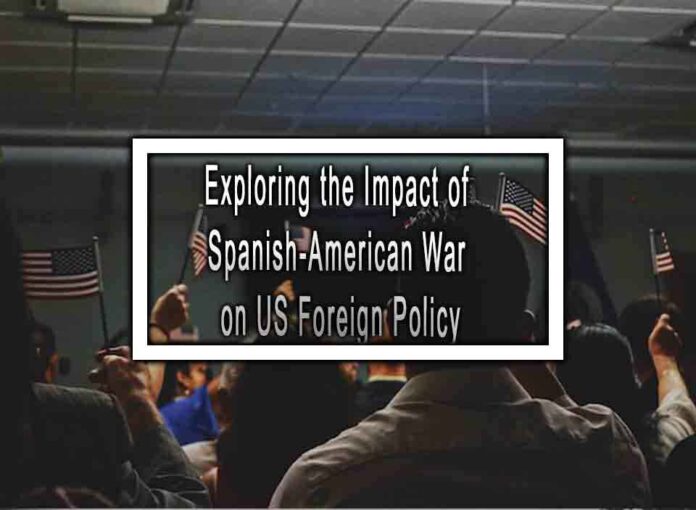The Spanish-American War of 1898 had a significant impact on U.S. foreign policy, shaping the nation’s approach to international relations in the 20th century. Here is an exploration of the key ways in which the war influenced U.S. foreign policy:
1. Emergence as a World Power:
- The victory in the Spanish-American War marked the United States’ emergence as a global power. It acquired overseas territories, including Puerto Rico, Guam, and the Philippines, and established itself as a force to be reckoned with in international affairs.

2. Imperialism and Expansionism:
- The acquisition of new territories in the Caribbean and the Pacific Ocean reflected a shift toward imperialistic and expansionist policies. The United States joined the ranks of colonial powers, which had a profound impact on its foreign policy outlook.
3. Open Door Policy:
- The U.S. sought to protect its economic interests in Asia, particularly in China. To this end, it advocated for the Open Door Policy, which called for equal access to China’s markets by all foreign powers. This policy aimed to prevent the colonization of China and maintain a sphere of influence for American trade.
4. Roosevelt Corollary to the Monroe Doctrine:
- In 1904, President Theodore Roosevelt issued the Roosevelt Corollary to the Monroe Doctrine. This policy stated that the United States had the right to intervene in the affairs of Latin American countries to maintain stability and protect its interests. It expanded the reach of U.S. influence in the Western Hemisphere.
5. Big Stick Diplomacy:
- Theodore Roosevelt’s foreign policy approach, often called “Big Stick Diplomacy,” emphasized a strong military presence and a willingness to use force when necessary to protect U.S. interests. This approach was evident in his mediation of the Russo-Japanese War and his role in the construction of the Panama Canal.
6. Dollar Diplomacy:
- Under President William Howard Taft, the United States pursued a policy known as “Dollar Diplomacy.” This approach aimed to use American economic influence to promote stability and secure U.S. business interests in Latin America and East Asia.
7. Increased Naval Power:
- The Spanish-American War prompted the United States to invest in a modern, powerful navy. The expansion of the U.S. Navy reflected a commitment to protecting American interests and projecting power globally.
8. Shift in Focus to the Pacific:
- The acquisition of the Philippines, Guam, and Hawaii signaled a shift in U.S. foreign policy focus from the Atlantic to the Pacific. This shift would become even more pronounced in the years leading up to World War II.
9. Humanitarian Intervention and Idealism:
- The war was justified, in part, on humanitarian grounds, with the U.S. citing the need to liberate Cuba from Spanish rule. This emphasis on ideals and values in foreign policy would reappear in U.S. rhetoric and actions in later conflicts.
10. Influence on Future Conflicts:
The Spanish-American War and its aftermath set precedents for how the United States would approach future conflicts, including World War I and World War II. It established a pattern of U.S. intervention in overseas conflicts to protect perceived national interests.
The Spanish-American War had a profound and lasting impact on U.S. foreign policy, shaping the nation’s role as a global power and influencing its diplomatic, military, and economic strategies in the years that followed. It marked a transition from a largely continental power to one with interests and responsibilities that extended far beyond its own borders.












